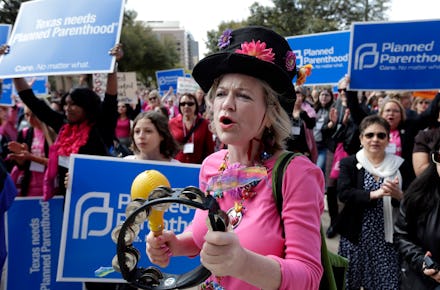Two Years After Shutting Down Planned Parenthood, Here's What Happened to HIV in Indiana

March was not a good month for Indiana. With all the attention on the fallout over the controversial passage of the Religious Freedom Restoration Act (RFRA), you might have overlooked that the state is currently fighting the worst HIV outbreak in its history. By the end of March, dozens of new cases had been reported in the small city of Austin, Indiana.
But if you do have HIV in Austin, you may not even know it — Scott County, where the city is located, has been without an HIV testing facility since 2013. The epidemic, largely caused by rampant use of intravenous drugs, prompted Indiana Governor Mike Pence to reverse his earlier opposition to needle exchange programs.
The county's previous sole provider, a Planned Parenthood, shuttered in 2013. The Scott County Planned Parenthood, along with four others that have shut down in the state since 2011, were all victims of public health spending cuts.
Planned Parenthood has been under attack in Indiana for years as part of a larger casualty in the struggle over abortion rights in the U.S. In 2013, the state legislature passed a law that expanded the definition of "abortion clinic" in an attempt to shut down a facility in Lafayette. The facility handed out the pill mifepristone, which allowed women to terminate pregnancies without surgery. A federal judge ultimately threw the law out. In another effort in 2011, former governor Mitch Daniels, attempted to cut state funding completely.
Although the Scott County facility had not provided abortions, conservative zealots were aiming to dismantle anything that was associated with the practice. Shutting down Planned Parenthood is a casualty in a larger war against healthcare that's had unexpected consequences by removing the various other life-saving services the clinic offered besides abortion.
Indiana's bone-headed approach to public health is only the latest chapter in a much larger story of how politics often trumps science and leads to disastrous consequences.
We've seen this before. When HIV first broke into America's public consciousness in 1981, it was largely written off as a "gay disease," and tragically not given the attention it should merited at the time. According to his own biographer, Lou Cannon, President Ronald Reagan's response was "halting and ineffective."
By the time Reagan first mentioned the word "AIDS" publicly in 1985, thousands had already died. The political sluggishness largely reflected the bent of his own political base. Gay men, who were among the disease's first sufferers, were (and remain) roundly condemned by evangelical conservatives like Pat Roberson and the late Jerry Falwell, who often decried public intervention by arguing that the virus came from God as punishment for sinful behavior.
More recently, conservative Christians campaigned against the life-saving drug Gardasil. The vaccine prevents two types of Human papillomavirus (HPV) that cause 70% of cervical cancer, as well as two types that cause genital warts. Over 4,000 women die of cervical cancer every year. Those opposed to the vaccine, however, objected on moral grounds under the belief that it would lead to increased sexual activity in young girls, even though studies have roundly shown that not to be the case.
While religious freedom is certainly an important cornerstone of America, as a nation, the U.S. must find a balance between accommodating religious practice and good science.
By not understanding the work of places like Planned Parenthood and going after anything even remotely pro-choice, conservatives are inadvertently removing the health services so many others rely on, like HIV testing. And without that, the problems in Indiana are only going to get worse.